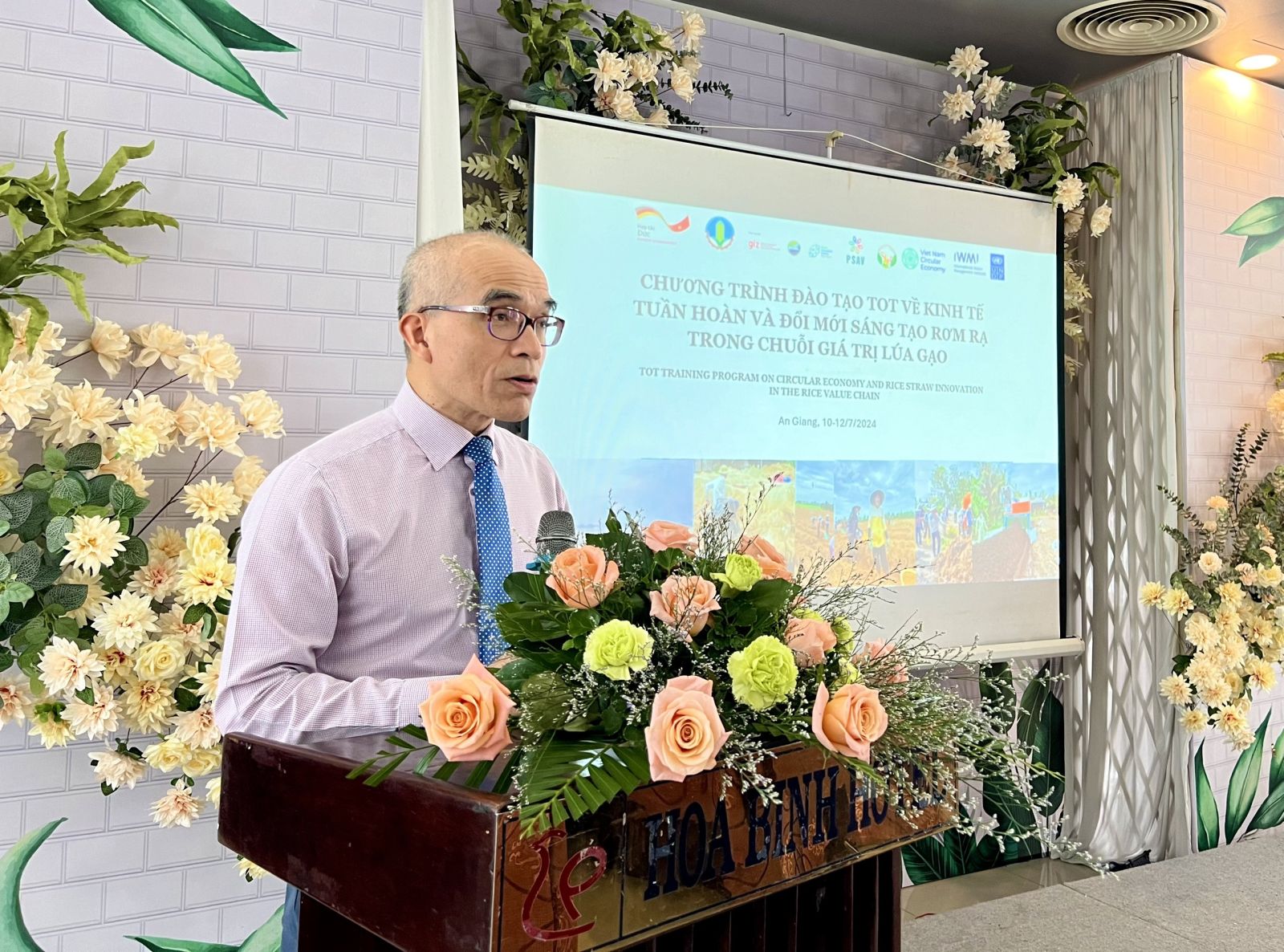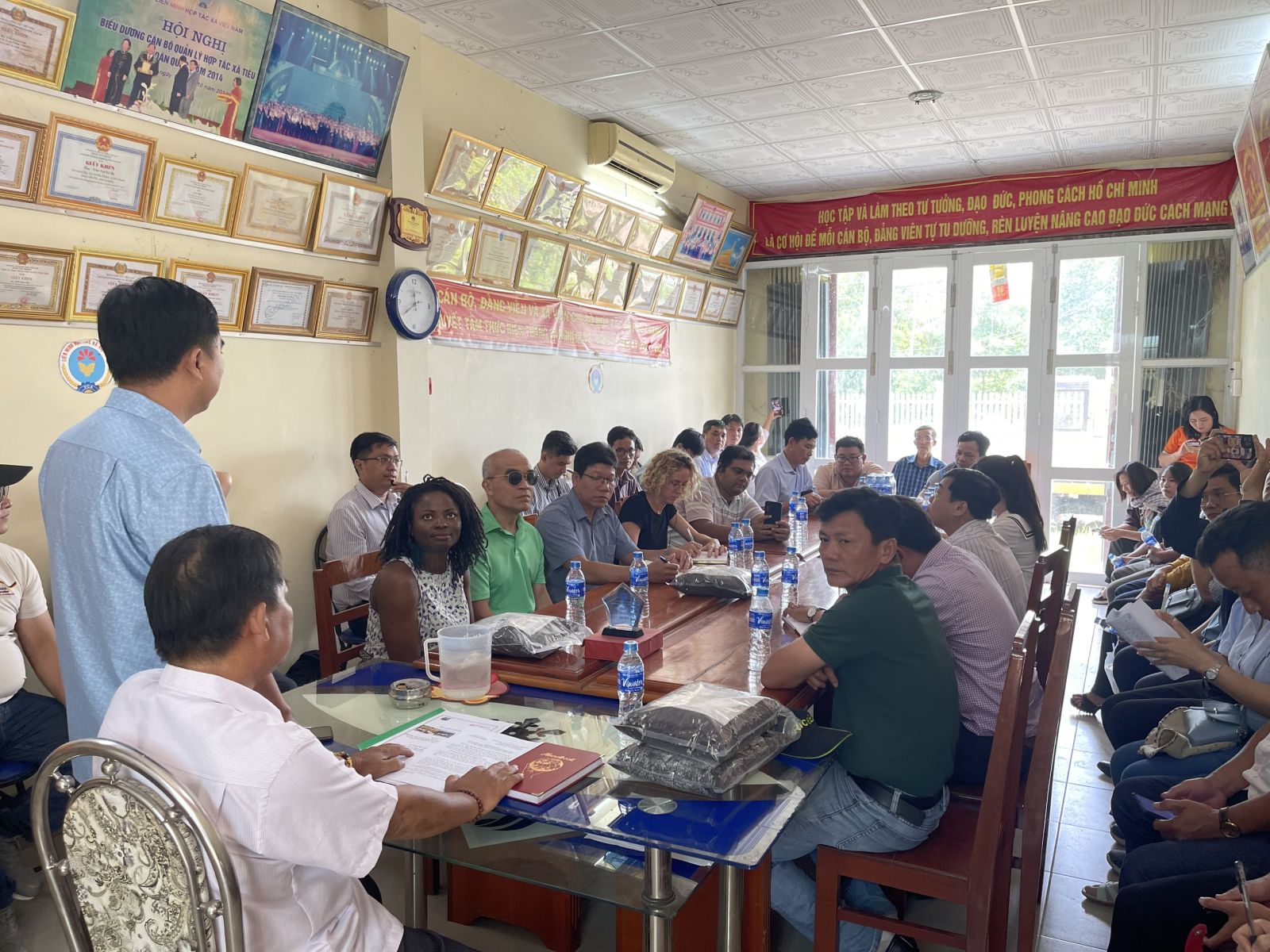- Giới thiệu
- Nhóm Công tác
- Tin tức
- Thông tin về FTA
- Tài Liệu
- Sự kiện
- Liên hệ
Training Course on Circular Economy and Innovation in Rice Straw in the Rice Value Chain in An Giang
On the morning of July 10 in Long Xuyên City, An Giang Province, the opening ceremony of the T.O.T training course "Circular Economy and Innovation in Rice Straw in the Rice Value Chain" took place. The training course is organized by the Partnership for Sustainable Agriculture in Vietnam (PSAV) in collaboration with the Science Institute of Rural Development (SIRD), the United Nations Development Programme (UNDP), the International Water Management Institute (IWMI) and the German Agency for International Cooperation (GIZ). The opening session was attended by Mr. Tô Việt Châu, Deputy Director General of the International Cooperation Department – Ministry of Agriculture and Rural Development, and Mr. Tôn Thất Thịnh, Deputy Director of the Department of Agriculture and Rural Development of An Giang; along with officials, lecturers, and 35 trainees who are agricultural extension officers from An Giang, Kiên Giang, and Cần Thơ.

Over the three days from July 10 to 12, the training course aims to help farmers, agents, and stakeholders transition from a linear economy model, which depletes resources and pollutes the environment, to a circular economy model. The program is designed to help participants grasp the basic concepts of the circular economy in agriculture; learn ways to handle and utilize rice by-products following the circular economy approach; and share practical experiences from waste treatment models in local rice value chains.
In his opening remarks, Mr. Tôn Thất Thịnh, Deputy Director of the An Giang Department of Agriculture and Rural Development, observed that the circular economy in agriculture is transforming the production methods of many businesses, cooperatives, and farmers in An Giang Province. This transition is contributing to the development of closed-loop models, environmental protection, increased income, and the formation of new production mindsets. For example, using straw to grow mushrooms and then repurposing the straw residue as organic fertilizer for rice and other crops; using straw as animal feed and then using animal manure as organic fertilizer for crops; using rice husks as fuel and the resulting ash as fertilizer for crops. Additionally, straw and husks are used for various other purposes, such as making biological bedding, building materials, biochar, handicrafts, and pharmaceuticals. These solutions help enhance the added value of rice by-products while creating clean and sustainable energy. This not only improves production efficiency and reduces pressure on natural resources but also helps reduce greenhouse gas emissions and mitigate the impacts of climate change.

Also at the opening ceremony, Mr. Tô Việt Châu, Deputy Director General of the International Cooperation Department – Ministry of Agriculture and Rural Development, emphasized that in the context of depleting resources and increasing environmental pollution, transitioning to a circular economy model is not just an option but a critical necessity. The circular economy not only helps reuse and reduce waste but also creates opportunities to add value from existing resources. This is an inevitable trend and a goal that the province is particularly focused on, aiming for sustainable and green development, contributing to the implementation of the One Million Hectares of High-Quality, Low-Emission Rice Project in the Mekong Delta, and becoming a center for high-tech agricultural development.
Mr. Châu also expressed gratitude to the United Nations Development Programme (UNDP), the International Water Management Institute (IWMI), the Science Institute of Rural Development (SIRD), and the German Agency for International Cooperation (GIZ) for accompanying PSAV in preparing for the training course and compiling the materials for the trainees. Through this training course, Mr. Châu hopes that the most basic and practical knowledge about the circular economy will be provided to the participants, and he wishes for the course to be a great success.
The following photos were taken during the training course's field trip:


Tin liên quan
PSAV Attends the 30th Anniversary Celebration of Cargill Vietnam2025/10/23
Plant health management helps increase coffee yield up to 15%2025/10/16
An Giang to host 2025 OCOP forum for sustainable development2025/09/25
Viet Nam and France foster cooperation on blue economy and sustainable environment2025/09/29
Agriculture and Environment exhibition ready for National celebration2025/08/27



 Điều lệ hoạt động
Điều lệ hoạt động



















































